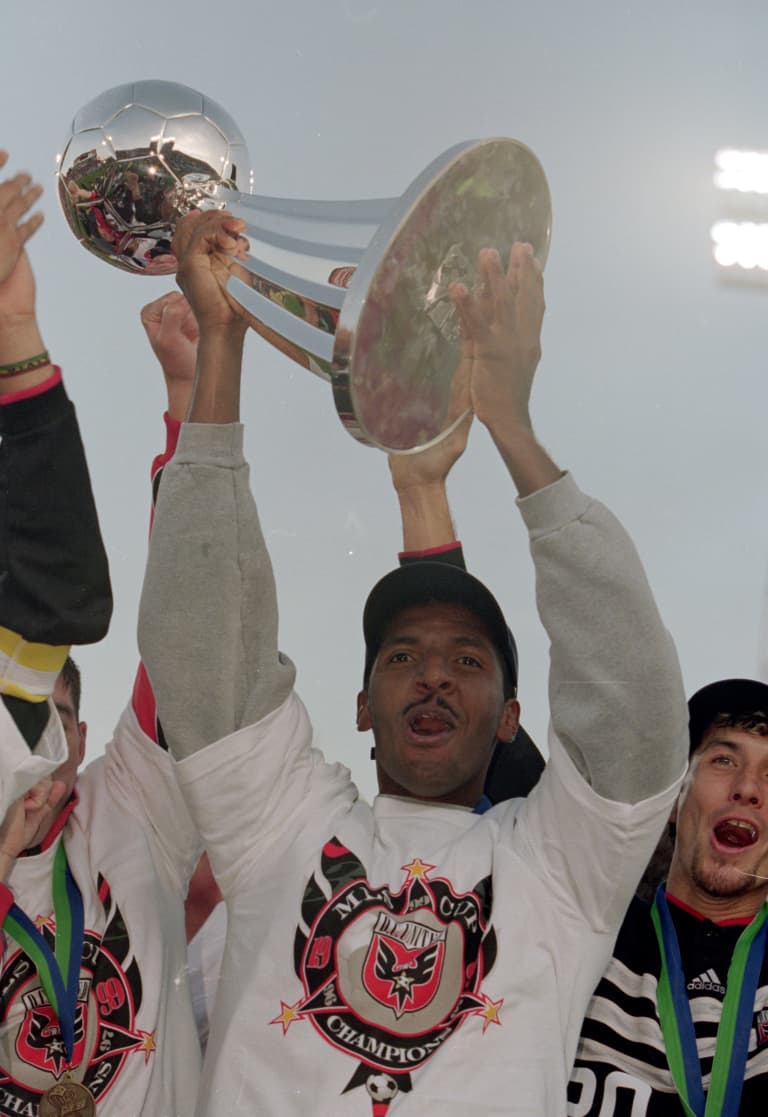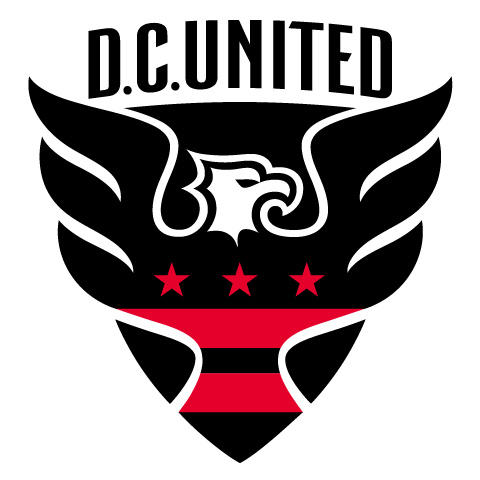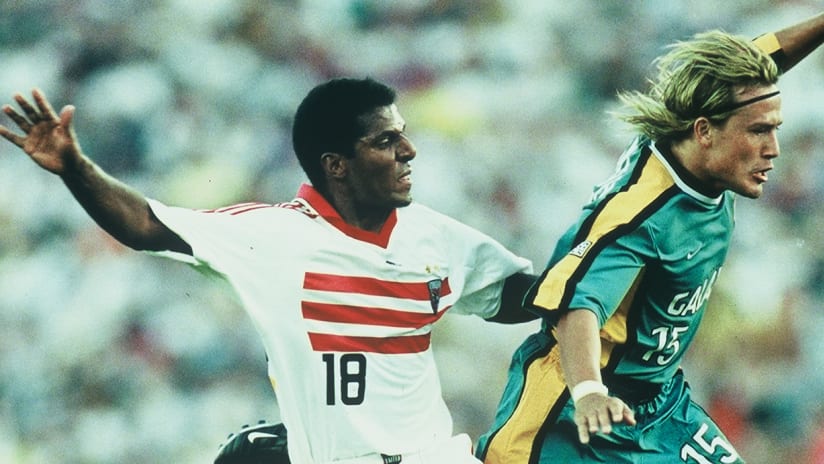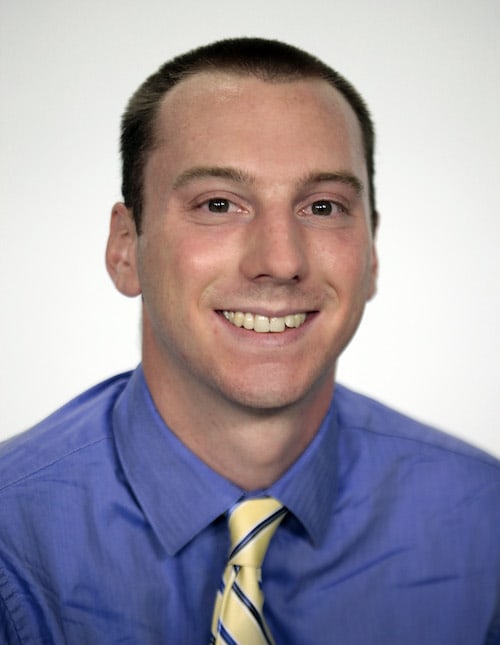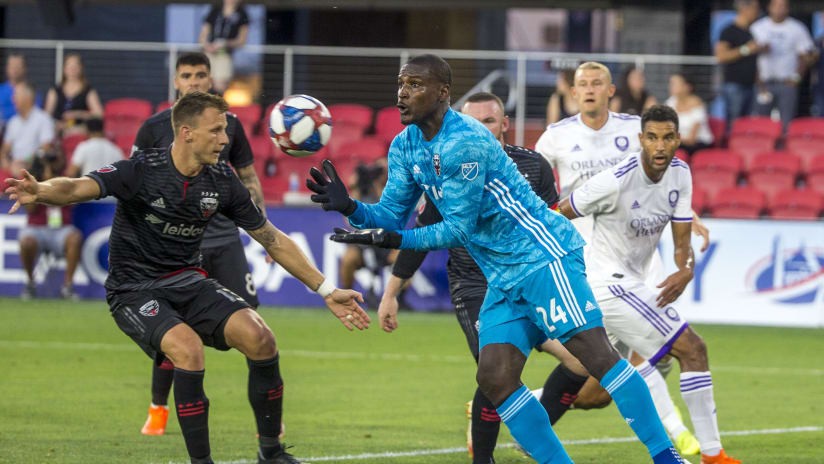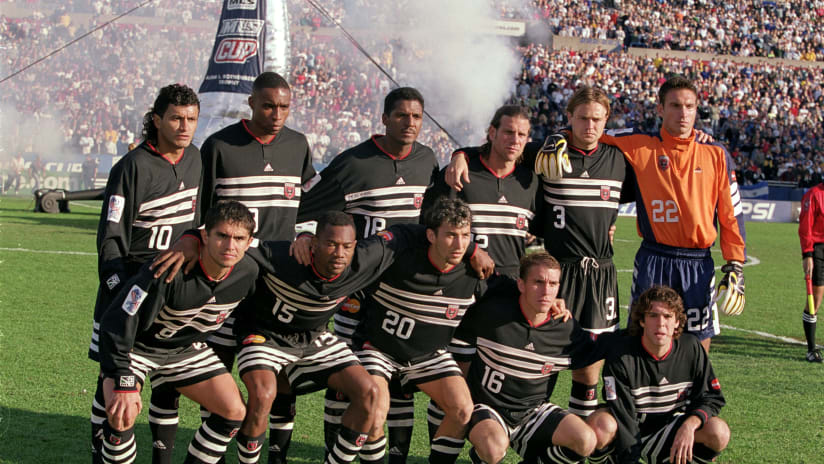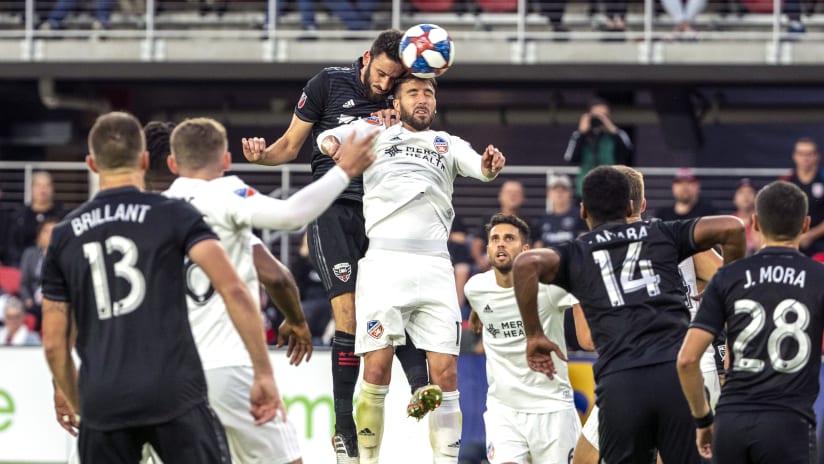Twenty years ago, on Nov. 21, 1999, D.C. United captured its third MLS Cup in four seasons to cement its legacy as the first true dynasty in league history, a claim that would be strengthened when the Black-and-Red captured another title five years later. And on that balmy November afternoon at Foxboro Stadium, before a raucous crowd of nearly 45,000 fans, United bested the LA Galaxy in a 2-0 victory that served as the capstone for a remarkable campaign.
That season, under the direction of first-year coach Thomas Rongen, United posted the best record in MLS (23-9), scored the most goals in MLS (65) and finished with the best defensive performance in franchise history (43 goals conceded). Defender Jeff Agoos, midfielder Marco Etcheverry and forward Jaime Moreno were all named to the MLS Best XI, tied with the Galaxy for the most players from a single team.
Over the next few weeks, we will recreate the ’99 season through the memories of those who lived it: the players, coaches and staff members who exorcised their demons from a crushing defeat in the 1998 MLS Cup to hoist a trophy and parade it through the streets of Washington D.C., rewarding those faithful fans who had stuffed RFK Stadium to its capacity all year.
Our next viewpoint comes from Carlos Llamosa, a player considered among the best defenders of his era in MLS. The Black-and-Red selected Llamosa with the No. 8 pick in the 1997 MLS Supplemental Draft and quickly reaped the rewards of his talent. Llamosa became a four-year starter for United and logged at least 1,400 minutes in every season with the club. He captured two MLS Cup titles during that span and would later be named to the league’s Best XI while playing for the Miami Fusion in 2001. Llamosa also earned 29 caps for the U.S. National Team, including two appearances in the 2002 FIFA World Cup.
Today, Llamosa works as an assistant coach for the Portland Timbers.
iTunes | Spotify | Stitcher | Google Play | SoundCloud
Q: What do you recall about the mood of the team and the expectations going into the ’99 season after reaching MLS Cup in ’98 but not winning it like you wanted to?
A: That was the expectation for the whole team, you know? We were looking for, let’s say, revenge because we had a great season in 1998. We won the CONCACAF Champions’ Cup beating Toluca that year. And then we reached MLS Cup final and then we lost to Chicago 2-0. So coming into ’99 we were trying to get back to the Cup and win it this time. So from day one, that was the team mentality.
What do you remember about Thomas Rongen coming in and what was the transition like from Bruce Arena?
It was a little bit different because personality-wise, Bruce and Thomas are two different people. They have different MOs of coaching and talking to players. Obviously for Bruce, he had three years with the whole group. Half of the group was with him in Virginia when he was the college coach there. So that was a different relationship with Bruce and the players. And Thomas coming as a new coach to a new team that reached MLS Cup final three years in a row, it wasn’t quite easy for him.
At the beginning, I think we had a good start in preseason with Thomas. As soon as the time continued going and we played the games, I think we started knowing each other. Thomas started organizing each player’s talent, where we can use that player. And I think he managed us really well. He managed us really well that year, that season. We became MLS Cup champions again.
Who were some of the leaders on the team that acted as intermediaries between Thomas and the players? Who stepped up vocally that season?
What I recall, Thomas, he became really close to Jaime Moreno that year. He was really close with Jaime. He was always talking to him. He was like the link between the Spanish-speaking players and the Americans. The coaching staff was fully English speakers. Jaime Moreno was the link between the two cultures we had on the team in that moment.
That team won the Supporters’ Shield and scored 11 more goals than any other team in the league. But on the defensive side, which is obviously where you played, it was also the best defensive season in D.C. United history to that point in terms of fewest goals allowed. With the guys around you — whether it was Jeff Agoos, Eddie Pope, Carey Talley or whoever you had on the back line — what worked so well defensively?
I think we had a good group of defenders and goalkeepers, so no matter who stepped on the field, the coaches, the fans, the teammates, we knew anybody who stepped on the field was going to perform really well. We had, at that moment, Eddie Pope, Jeff Agoos, myself. Sometimes we had to leave the team to go to national team duty, and when we were away with the national team, we had Carey Talley, Diego Soñora, we had a bunch of guys in the back who can play the position and get the points when the guys who usually played were away with the national team. That season in goal we had Tom Presthus, who I believe that was his first year as a starter, and he did really well that year.
What do you remember about the environments at RFK Stadium?
Well actually, (earlier this month) when we played San Jose at home here in Portland, I was talking to a guy who works for ESPN now. He used to live in D.C. when I played for D.C. United, and he said, ‘The last time I recall an environment like that was when you used to play at RFK.’ I would say the first Barra Bravas were those D.C. United fans. The Barra Bravas, the Screaming Eagles jumping for 90-plus minutes at those matches in RFK, I think that was a plus for us as a team and as players.
There was a point in time in August and September when you won 11 straight games going into the playoffs. When that team was at its best in ’99, what made it so dangerous and so capable of beating just about anybody in the league?
Well the confidence we have in our team, and the quality was there. We had a lot of talent in that team. The confidence that we were playing (with) at that moment was really high. It doesn’t matter if we play at home, in D.C., or if we play away. We always stepped on the field with the same confidence: try to push for the game, to win. We never tried to speculate, especially playing in front of our home. So I think that was the key to that team.
What was it like to supply the ball for players like Marco Etcheverry and Jaime Moreno and Roy Lassiter? And also just to watch what they were able to do in the attacking third. Was that a special group?
Oh yeah, definitely. In part, those guys made our job easier, you know, because we only had to worry about defending. We defend, take the ball away from the other team and then just give it to one of those guys in the middle: to Marco, to Richie (Williams) or the guys up front like Roy and Jaime, you know? And they did the special things they used to do, the magic that we called it.
I was speaking to one of your teammates who told me watching Marco do what he did from a distribution standpoint, being able to play balls when it didn’t even seem like he was looking at the intended target, and also taking on a little bit of a leadership role was really unique. What type of player was Marco Etcheverry and what do you think he meant to MLS at that time?
I tell you what, I think he was the best player at that moment (during) the first couple years of MLS. If he wasn’t the best player in MLS, he was in the top three. He was fantastic and being on the field every single day with Marco was special for me. The quality that he brought to the field every single day in practice no matter what we do: small-side games, 5-vs-2, full-field games. I mean, the guy was always 100 percent. He was a natural. It was like sometimes he wasn’t even trying and he was the best all the time. It’s special for me to have had the opportunity to play and share the same locker room and the same field with a guy like Marco Etcheverry.
When you started to get toward the playoffs coming off that 11-game winning streak, did everybody feel good at the time, like you had a pretty good chance of reaching your goal?
Yeah, we knew we had a good chance. But at the same time, we knew we had to be our best because we can’t relax, we cannot fall asleep in any of those games. Especially in the Eastern Conference there were good teams. The MetroStars, Columbus Crew, New England — there was always what we called rivalries. It was the MetroStars against D.C., but we played Columbus like two or three Conference Finals when I was there, so that was another rivalry.
And then if I recall, right before playoffs I think I had a knee injury, a sprained MCL, and I missed the first round of the playoffs and then I missed the first game of that Conference Finals against Columbus. We missed like two or three guys in that away game against Columbus (in Game 2 of the series), and I believe we lost 5-1.
I was going to ask you about that. So you win Game 1 and then you go to Columbus in Game 2 and lose 5-1. For as much talent and confidence as you guys had, what is it like to get ready for Game 3 after you get beaten pretty soundly?
Yeah, that was a bad loss. We knew Game 3 in D.C. we had to perform our best in order to beat Columbus. Those guys had a great team in that moment as well. And as I said before, as a team when we needed to perform, when we needed to step on the field and get things done, that’s what we did in that Game 3. I believe it was 4-0 in Game 3 at home. Marco Etcheverry was fantastic in that game and Roy Lassiter. I believe Roy Lassiter scored a bicycle kick in that game, and Marco scored a fantastic free kick.
You’re exactly right. You have a great memory. That game in particular Marco had a goal and three assists, Roy had two goals, Jaime had a goal and you get a clean sheet defensively. Was that sort of like the perfect performance?
Yeah, that was a perfect performance. I was glad. I was happy because that was my first game after like a month and a half that I was out with the MCL injury. I recall I played with a knee brace. I was worried during the game that if I get into a hard tackle I would be injured again and then miss the MLS Cup final. But I played the entire game and I was glad to get the clean sheet and then score four goals by the guys up front.
What do you remember about the week between that game and MLS Cup? Was anybody anxious or nervous before the final?
No, no, no. We knew we had a big game coming up. Most of the group that we had that year, that was the group that played in ’98 and ’97 MLS Cup finals. So that was a group who played MLS Cup final before, so the confidence was there. We had to prepare well to play another big rivalry like LA Galaxy at that point.
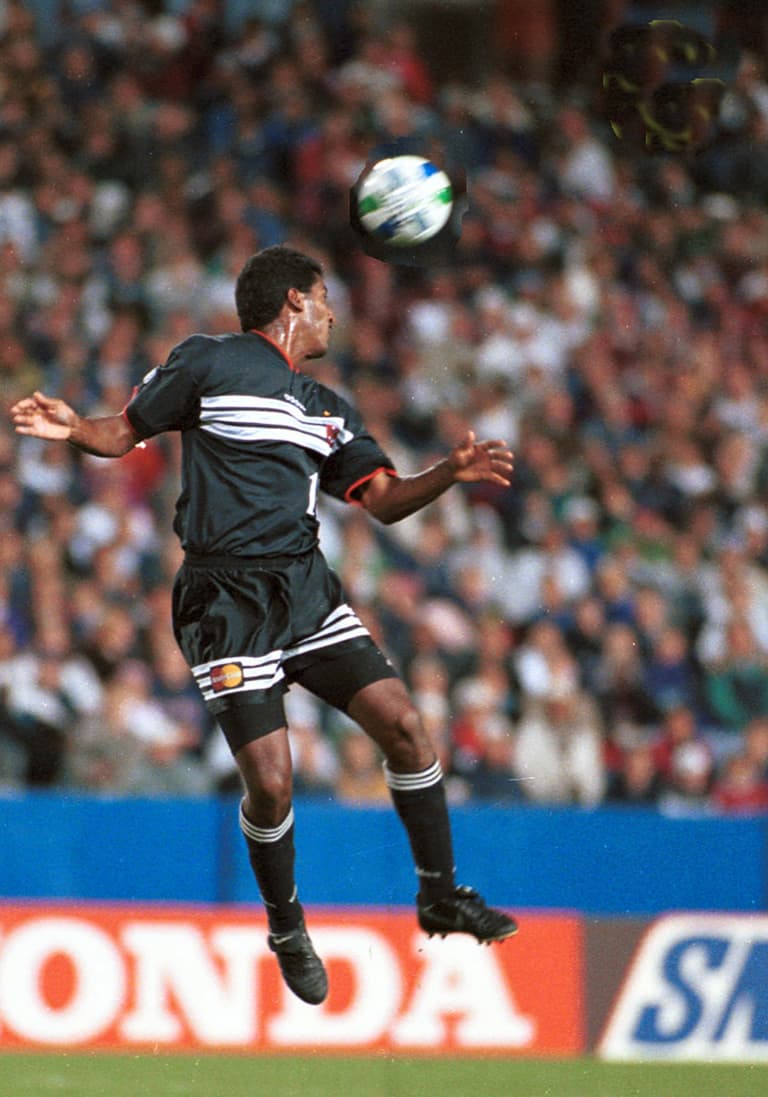
What was the most difficult thing to prepare for in regard to the Galaxy? What made them dangerous that season?
I’m not 100 percent sure, but that year during the regular season they beat us (once), I’m pretty sure. They were one of the best teams in the league that year. They had great players. That year they had Carlos Hermosillo up front, a guy who scored a lot of goals for them. Cobi Jones. They had a really good group. Robin Fraser in the back was the Defender of the Year. Kevin Hartman was one of the best goalies that year. So as a group, they were a strong team and we knew it was going to be a tough final. We knew we needed to be at our best.
Personally, my only concern was the knee injury. I was still playing with a knee brace, training with a knee brace the whole week before the game. That was my only concern. I wanted to get to the final as healthy as I can be. Fortunately for me, I made it to that game and I lasted like (74) minutes in that game. I had to come out with a knee injury at the end of MLS Cup final. I had a collision with our goalie, Tom Presthus, and he hit my knee. I had to come out of the game.
What went through your mind in the 19th minute when Jaime pokes that ball into the net and you take a 1-0 lead?
Well, I felt that things were bouncing our way this team because the year before, in 1998 when we lost 2-0, we got like two unlucky goals, let’s call it. One was a deflection, the other was offside that wasn’t called. And then we had like 20 shots on goal but we couldn’t score against Chicago. This time, at that moment, in the 19th minute, Jaime had the opportunity to score and it was like, ‘OK now, this year things are bouncing our way.’
And then 20 minutes later, I assume the idea that things were going your way was confirmed when the Galaxy make a goalkeeping error and there’s Ben Olsen to pop it in, sort of a garbage goal like his teammates described it. A guy that’s always in the right spot at the right time.
Exactly. Exactly. He was always in the right spot. He was always looking for second balls. He was a young player who recognized who he was playing with. He fit really well with Marco, with Roy, with Jaime. All those guys that we had around him, he fit perfectly coming out of college at a young age. He fit in really well. He was one of the most important players for us that year. Then he helped us win the MLS Cup final with that goal and he got the MVP of the Cup.
As the second half continues and the minutes are ticking away, I have to imagine it felt like the clock was moving extremely slowly after you got subbed off, right?
Oh yeah, definitely. It’s different when you are on the field. It’s like you are in control of everything, every decision that you make in the back, it’s in your own control. But being on the bench, you feel like helpless. I want to help! I want to help! But those 10 minutes were the longest 10 minutes of my career.
And when the final whistle blows and everybody starts celebrating, what did it feel like?
Joy. It was happiness. Everybody was like, ‘Damn, we made it again. We did it. We did it.’ We missed it in that game in ’98, we came back stronger in ’99 and we won the Cup again for the third time in four years.
Did it feel like you were a dynasty?
I think that was the first MLS dynasty, to be honest. Reaching the MLS Cup final four years in a row, that’s a dynasty. I would call it that.
When you think back to the first few days after that game, there was a parade in D.C. and I think you visited The White House. What was it like to return to D.C. freshly crowned as champions?
That was great. That was amazing giving that gift to the fans and to the city who support us for 10 months. To be able to go to Boston and win the Cup and bring it back to D.C., having a parade, we met the mayor first and then a few weeks later we met the President, so that was unbelievable. That was fantastic. We had the opportunity to give that back to the city, to the fans. For me, in those early years, they were the best fans in MLS around the league.
You had a tremendously successful career. You played with the national team, played all over in Major League Soccer. But starting MLS in the inaugural few seasons with D.C. United, does that time still hold a special place for you?
Yeah. It’s always going to be a special place for me. That’s the city, that’s the place where I start my MLS career and where I receive a lot of good things for me, for my family and my career.
And the last question I had for you is this: Being around the league in the capacity that you are as an assistant coach, I’m sure you run into some of your former teammates. When you see some of the guys who were part of those early years, do you ever reminiscence and talk about old stories?
Yeah, all the time. All the time. When I have the opportunity to talk to Ben, Richie or other guys who are still around in different roles around the league. We’re still talking about those D.C. years.
